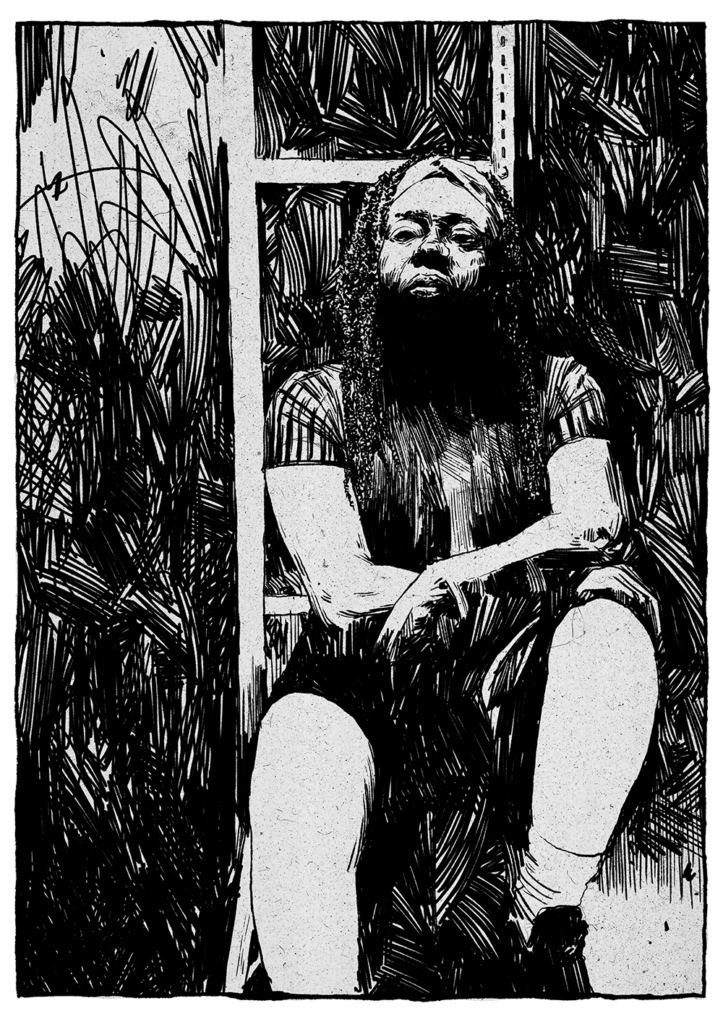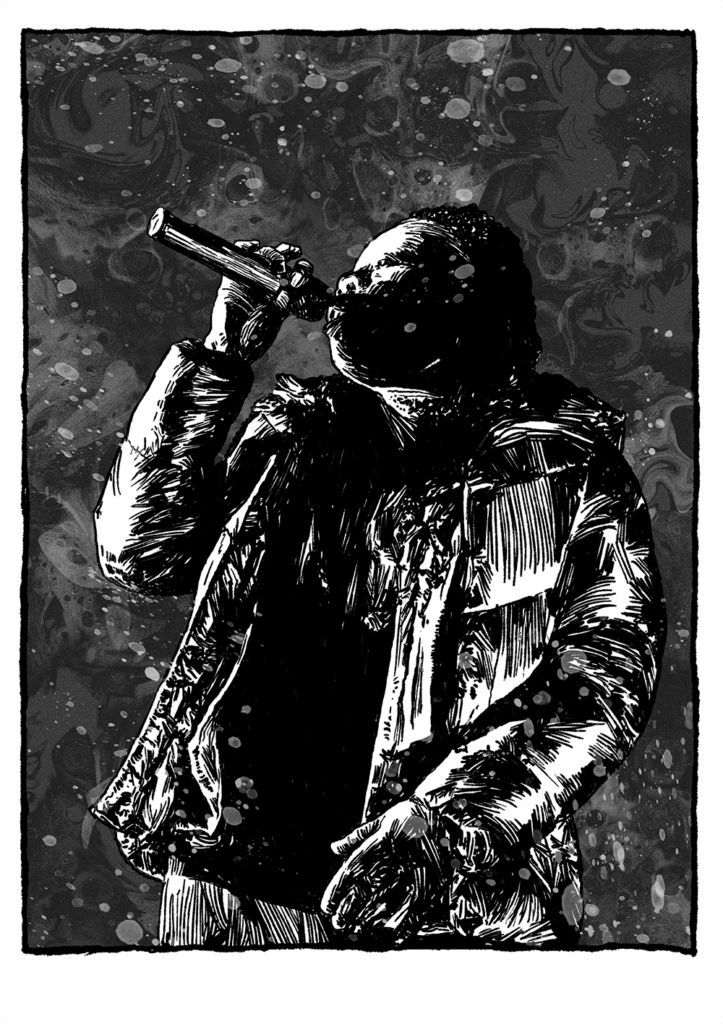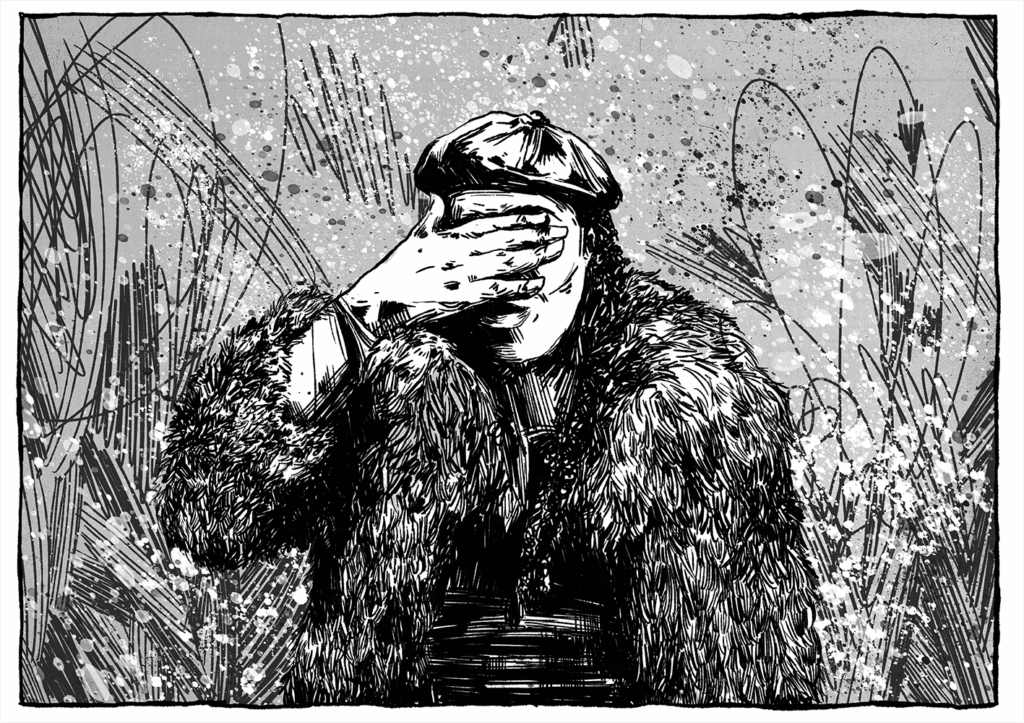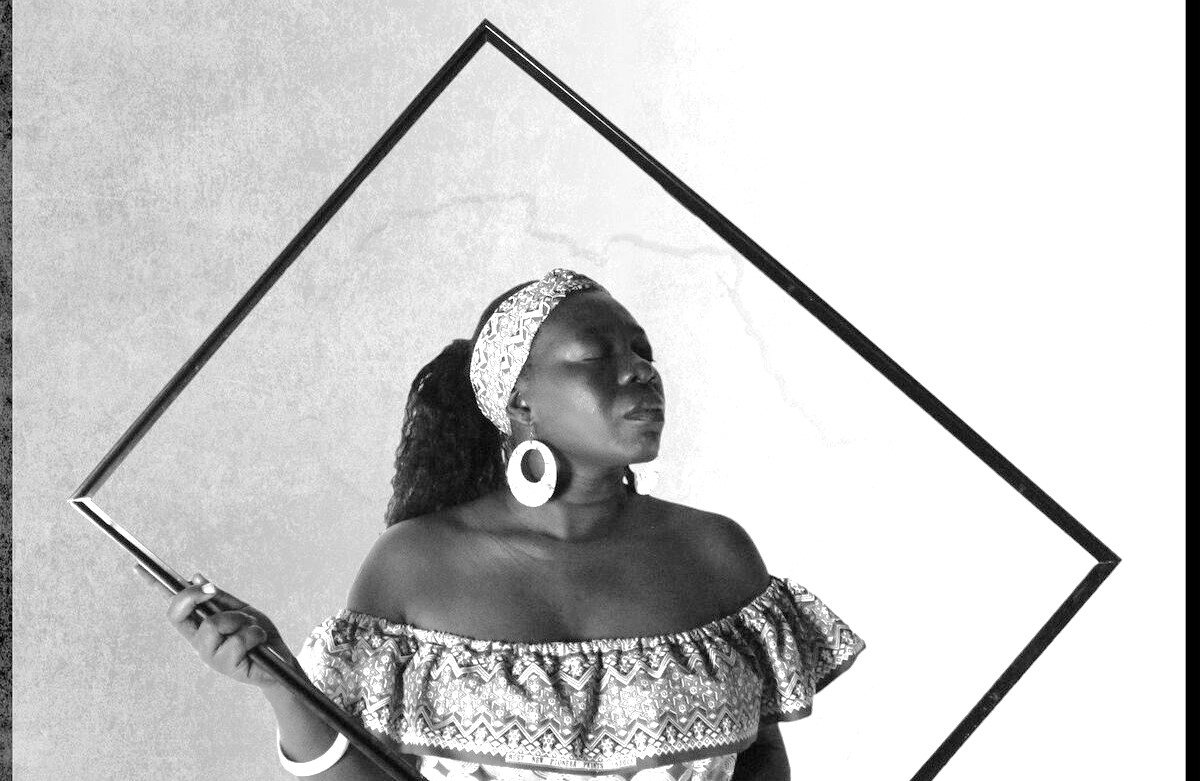Flavia Beaka
Flavia Beaka embodies the immediate charisma of rappers who gives the vibe, take up space, and occupy it it in a unique way. While randomly browsing YouTube, we crossed the “Kill Them” music video. Facing this great track, we couldn’t help but take a closer look at the rapper, from the famous Vallecas neighborhood, in the hills above Madrid.
Thank you for your availability and kindness! Go listen to her music; you won’t be disappointed!
Interview by Polka B. / Translated by Ali & Nino Futur / Artworks : Sal Paradise


Can you introduce yourself?
I see myself as a strong and simple woman, who likes to enjoy time with her family and friends. Eloquent and consistent with what she says, confident and passionate about sports. And of course, music!
When did you discover hip-hop? Who was the artist who influenced you the most?
I discovered hip-hop thanks to my older brothers. There are six of us, and I am the youngest. I was immersed in what they were watching, listening or doing. It had a big impact on me.
I could say that I had two big female influences in my adolescence: Lauryn Hill and Arianna Puello. There were other women who inspired me, who I may have discovered later. That doesn’t make them any less important, but I think those two were decisive for me.
Do you mostly listen to Spanish or American rap? What albums accompanied you throughout your adolescence?
I listened to Spanish, American, French rap… But not only rap. Also reggae and dancehall. I listened to everything, from Violadores del Verso, 7 Notas 7 Colores or VKR to Capleton or Sizzla, via Nas, Fugees, 113, IAM, Wu Tang Clan, Aretha Franklyn…
I can name a few albums that accompanied me:
The Fugees – The Score.
7 Notas 7 Colores – Hecho es Simple, 77.
Nas – Illmatic, It Was Written, God,s Son.
Lunatic – Mauvais œil.
Kery James – A l’ombre du show business.
Arianna Puello – El Gancho Perfecto.
How did you start rapping?
I started writing my first lines when I was about 13, but I didn’t show them to anyone… I guess it was a bit out of shame, because I was the only one of my friends who listened to rap. Later, with my friend Shey, we started showing each other what we were writing.
But it wasn’t until I was 15, when I met Nasta, from the Madrid underground collective Hijos Bastardos, that I recorded my first vocals.
From that moment on, I timidly started rapping in street circles, meeting more rappers my age and showing my lyrics and my style. That’s how it started.
According to what we see on social media, you live in Vallecas. What is life like there?
I used to live in San Blas, but when I was 8 years old, we moved to Vallecas, so I practically grew up there. Despite my young age, in San Blas I learned, saw and experienced a lot.
Vallecas is made up of two neighborhoods (Puente de Vallecas and Villa de Vallecas), which makes it one of the largest neighborhoods in Madrid. It is a popular, combative neighborhood, with great cultural diversity, where people with high earnings do not come to live. It was a neighborhood with affordable rents and many small businesses, but over the years, that has changed. Prices have gone up, many businesses have disappeared. But for me, the identity of the neighborhood have not changed.
Personally, I feel very comfortable there, I have the impression that everyone finds their place without anyone being above the others.

Let’s talk about your new project, why did you call it « Otra Vida 2024 »? What is the main idea of this album?
Otra Vida is called this because in the middle of the writing process, my older brother had a very serious car accident and almost died. So this title is a message, a cry. A hug for him, for my other siblings, for my parents and for me. Let’s enjoy every second of our lives, because there will not be a second chance.
The main direction of the album changed with that call from the hospital. I changed… EVERYTHING. The final goal was to be strong enough to finish what I had started months before, to get rid of my demons, my pain, my desires, to forgive and thank those who supported me… In short, to breathe again and enjoy the music.
What are the differences compared to your two previous albums Sangre (2016) / Alétheia (2021)?
If I hadn’t changed anything since 2016 and the release of Sangre until 2024 with Otra Vida, there would be a problem with me! (Laughs)
Today, I know myself better. I have a better relationship with myself, I appreciate my time, my energy and my work more, which allows me to express myself with confidence, whether in writing or rapping.
In Sangre, there is a Flavia that perhaps comes out more sensitive with a very deep writing where I open up in each song. In Alétheia, I continue to be deep and sensitive because it is something that is part of me but I bring out this harder and direct way of rapping… that would be the difference for me, a more raw way of saying things.
Would you say that you are above all a boom-bap rapper, or do you also appreciate the influences of current rap, like trap or drill?
Lately, I have worked a lot in boom-bap, especially with Naf Loops, who is a gem for me. But I do not lock myself in it, because with Rams, Chaman or other producers with whom I have collaborated, it is not necessarily this sound. And I also like this diversity.
But I do not see myself doing drill, for example. It is not really my thing. I also like afro sounds, but I haven’t found a producer who works in this style yet. So, I’m throwing a message in a bottle… in case a producer sees this and wants to work with me! I’m not against anything, but I only work on sounds that have a soul. I love music. If a rhythm or a beat makes me feel something and inspires me, then let’s go!
What is your song that represents the most your universe?
All my songs are 100% about who I am and my world, so I couldn’t choose only one. To be as fair as possible, I’ll mention one per project, even if it probably won’t be enough:
As you said, you often work with beatmakers like Rams and Naf Loops. Is it important for you to have a special relationship with producers?
Yes, it’s very important. Working with them has helped me a lot, because we have a great relationship and a real friendship. They know me well and know how to get the best out of me in the studio. So yes, there is a huge difference between working with beatmakers with whom you have a relationship of trust and others you don’t know.

The hip-hop and rap has always been predominantly masculine. Do you think this trend has changed a bit in recent years?
Would you say that there has been progress in Spain compared to the international scene? What is the place of women in rap today compared to previous generations? What has changed?

It is still a very male-dominated environment. Just look at the festival line-ups: how many men are there and how many women? And how often is a woman headlining?
However, in recent years there has been a change, although it is still minimal. Women, especially the younger generations, are having greater visibility.
I wouldn’t go so far as to say that they have more notoriety, but they are gradually finding their place on the scene. And that is great.
Compared to other countries, from my point of view, Spain is still lagging behind in terms of visibility and opportunities for women in hip-hop.
Today, young women – and not only young women, by the way (including me) – are building many bridges, creating a safe and supportive community. We collaborate, we share our music, and I didn’t see that before. We were more spread out. Now, there is no longer this unhealthy competition between us, or at least, I don’t feel it.
What has changed? We have changed. We have things to say, and it doesn’t matter whether people want to hear us or not. We just say it!
It doesn’t mean we’ll be number 1 on platforms or headlining festivals, but it makes us free and stronger. And that’s what we’ve seen emerging in recent years.
What do you think are the stigmas that the racialized population in Spain suffers from? What prejudices exist against the Afro-descendant community? Have you suffered any?
The racialized population in Spain suffers a lot. So many people are rooted in stereotypes and prejudices… that I don’t even know where to start. Racialized people are seen as illegal immigrants, poor people or criminals, and we are denied our identity as an integral part of Spanish society. We are culturally invisible.
There is structural racism as well as denial of this racism, which makes the fight against discrimination even more difficult. Women are exoticized or hypersexualized because of racial stereotypes... And there are many other examples, such as Islamophobia, anti-Semitism, the criminalization of youth, or the systematic association with precarious jobs.
I have endured racism, insults, and I was even assaulted once. I have been hypersexualized, my identity has been denied… but I am still here!


What are your plans for the future?
To continue to breathe for many more years, to keep my mind and soul clean. To enjoy my family and friends and to continue to things with love.
Musically, I don’t have a specific project, but I would like to explore new sounds like afro, Brazilian funk, soul… to mix these influences while staying true to my essence.
If you had to keep just two French rap albums, which ones would you choose?
I’m going to repeat myself but without a doubt, the two French rap albums that I listened to the most and that I still listen to today: « Mauvais œil » by Lunatic and « À l’ombre du show business » by Kery James (for me, these are 2 gems).
I’ve already told you about them but the influence of my big brothers is felt, because I discovered most of these legendary groups thanks to them. Others come back to me: NTM, 113, IAM, Mafia K’1 Fry, Kenza Farah, Diam’s, Zaho, Psy 4 De La Rime, Fonky Family, Oxmo Puccino, Don Choa, Saïan Supa Crew, Explicit Samouraï…
But also more current artists like Kaaris, Hamza, Maes, PNL, Niska, Jul, MHD… And there are certainly many others! I’m sure I’m forgetting many that don’t come to mind…
Finally, could you name 3 songs that you’ve listened to recently and that you enjoyed?
Of course!! Here are 3 songs by 3 women who inspire me a lot at the moment.
HUDA – “5mil” (I recommend you listen to her entire album, Jamila, and watch her video on YouTube. You might understand this song even better.)
IVY SOLE – “Dangerous” Feat. Kingsley Ibeneche (Extract from her album CANDID)
LITTLE SIMZ – “Point and Kill” (Extract from the album Sometimes I Might Be Introvert)
Thank you very much for wanting to get to know me better as an artist and as a person. Thank you for giving me the opportunity to discover myself elsewhere. A kiss and a hug!

